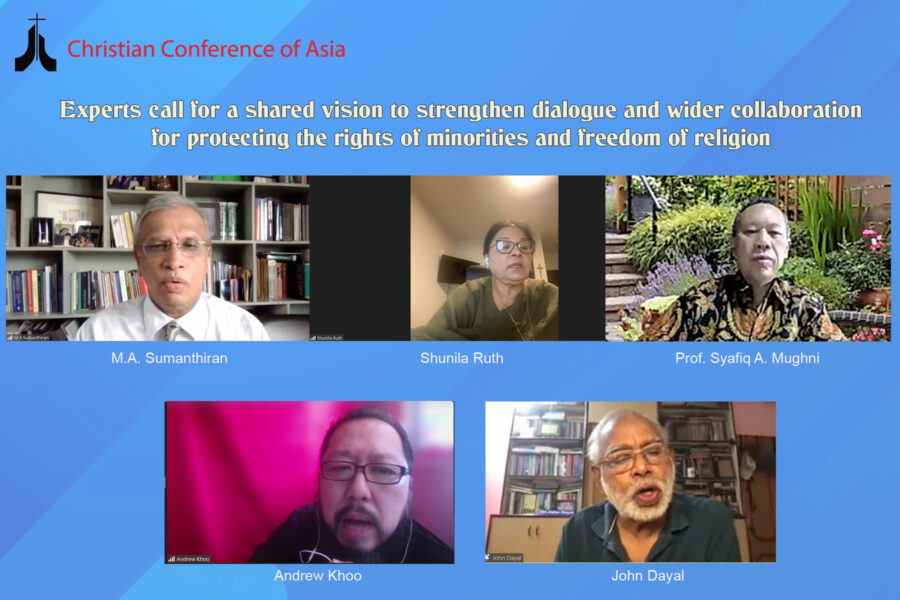Experts call for a shared vision to strengthen dialogue and wider collaboration for protecting the rights of minorities and freedom of religion

During a panel discussion at the Christian Conference of Asia’s (CCA) Regional Consultation on ‘Freedom of Religion, Rights of Religious Minorities, and Constitutional Guarantees in Asia’, a group of Asian experts called for a shared vision to strengthen dialogue and wider collaboration in protecting the rights of religious minorities and their freedom of religion.
Speaking at a plenary session on the final day of the four-day consultation, a panel of experts comprised of Members of Parliament, legal luminaries and human rights defenders and religious leaders suggested the need for multi-pronged strategies for wider coalitions towards the common goal of the protection and promotion of the rights of minorities in Asia.
Grounded in their experiences and perspectives, the panelists shared the hindrances to protection of freedom of religion and rights of religious minorities, and proposed effective ways to build relationships with other stakeholders.
M.A. Sumanthiran, a Member of Parliament from Sri Lanka, said that the closest allies present in our struggle to secure minority rights were, in fact, other minority groups themselves. Communities that were smaller in number tended to band together to defend common minority rights.
Mr Sumanthiran, a top human rights and constitutional lawyer in the Supreme Court of Sri Lanka, further shared a strategy to dilute extremist tendencies in communities: “We have thought of pre-empting extremist situations by bringing together religious leadership in the country. Young people are involved in this process, they visit different towns, bring leaders together, and encourage them to work together as a pre-emptive step to prevent any religious extremist attacks on any group or any particular incident from happening. We can tap into existing networks and revitalize such relationships at the grassroots.”
Shunila Ruth, a Member of Parliament from Pakistan, proposed new ways of dialogue saying, “Through a rights-based approach, we must pursue new ways of dialogue focusing on the integral development of all communities and going beyond theological discussions. Religion, culture, politics, and economics are not separate and must all be taken into account for constructive dialogue.”
Ms Ruth shared examples of certain initiatives taken by the current Pakistani government to robustly work on the resolution of religious conflicts, adding that it was the implementation of the laws that were a challenge, and not the laws themselves.
“We don’t need more laws but need to change mindsets with greater awareness; religious leaders, especially the churches in Pakistan, can become allies in educating our own people”, stated Ms. Shunila Ruth, one of the women parliamentarians of Pakistan’s ruling party, who is a member of the Church of Pakistan.
Prof. Syafiq A. Mughni, the Special Envoy of the President of Indonesia for Interfaith Dialogue and Cooperation, talked about the existing challenges and interreligious tensions in his country.
“Religion is not used as a moral foundation for political development or guidance for political interest, but as a vehicle to monopolise power at the expense of people from other religions,” said Prof. Mughni.
Prof. Mughni, who also serves as the Chairman of the Muhammadiyah Central Board in Indonesia, emphasised the importance of trust and respect in interfaith dialogue for enhanced cooperation. He provided positive examples of how education was used to empower religious leaders and religious institutions in conflict-prone regions in Indonesia.
Andrew Khoo, Solicitor in the High Court of Malaya, Malaysia, shared the five marks of mission that could serve as guiding principles for the Church to more relevantly engage in FoRB work. He also shared non-traditional and alternative strategies for faith communities or FBOs to expand their work.
“The Church needs to look within and try to be a different, counter-cultural voice. If we are not part of the solution, we are part of the problem. Is the Church part of the institutionalized power structure, or the voice of the people, or somewhere in between? Is the Church protector or perpetrator?” asked Mr Khoo during his presentation.
John Dayal, a human rights activist and journalist from India, with five decades of experience, spoke of the barriers of extremism as well as of the decline of institutions that was further isolating minority groups in his country.
He broke down the existing socio-political climate and called upon the Christian minority in India to refrain from playing into narratives of polarization and divisiveness, or pitting oneself against other minority groups in a tokenistic way in order to gain favour from those in power.
“What we seek from those in authority, the state, is a re-empowerment of the Constitution and our institutions, reviving and strengthening them with the power and the mandate to act without fear or favour,” said Dr Dayal.
About 50 participants from across Asia attended the Consultation from 5 to 8 October 2021.











